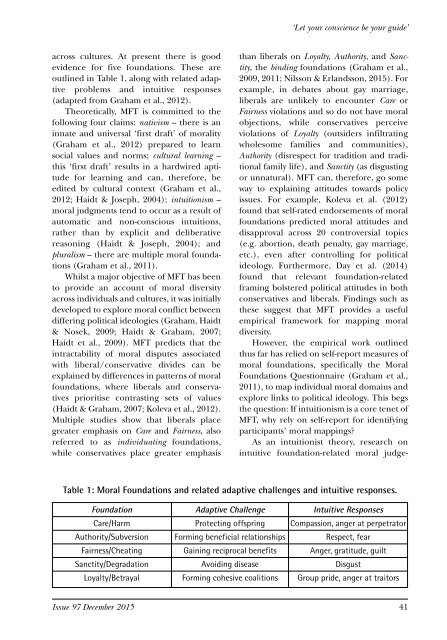Social Psychology Special Issue
PsyPAG-Quarterly-Issue-973
PsyPAG-Quarterly-Issue-973
You also want an ePaper? Increase the reach of your titles
YUMPU automatically turns print PDFs into web optimized ePapers that Google loves.
‘Let your conscience be your guide’<br />
across cultures. At present there is good<br />
evidence for five foundations. These are<br />
outlined in Table 1, along with related adaptive<br />
problems and intuitive responses<br />
(adapted from Graham et al., 2012).<br />
Theoretically, MFT is committed to the<br />
following four claims: nativism – there is an<br />
innate and universal ‘first draft’ of morality<br />
(Graham et al., 2012) prepared to learn<br />
social values and norms; cultural learning –<br />
this ‘first draft’ results in a hardwired aptitude<br />
for learning and can, therefore, be<br />
edited by cultural context (Graham et al.,<br />
2012; Haidt & Joseph, 2004); intuitionism –<br />
moral judgments tend to occur as a result of<br />
automatic and non-conscious intuitions,<br />
rather than by explicit and deliberative<br />
reasoning (Haidt & Joseph, 2004); and<br />
pluralism – there are multiple moral foundations<br />
(Graham et al., 2011).<br />
Whilst a major objective of MFT has been<br />
to provide an account of moral diversity<br />
across individuals and cultures, it was initially<br />
developed to explore moral conflict between<br />
differing political ideologies (Graham, Haidt<br />
& Nosek, 2009; Haidt & Graham, 2007;<br />
Haidt et al., 2009). MFT predicts that the<br />
intractability of moral disputes associated<br />
with liberal/conservative divides can be<br />
explained by differences in patterns of moral<br />
foundations, where liberals and conservatives<br />
prioritise contrasting sets of values<br />
(Haidt & Graham, 2007; Koleva et al., 2012).<br />
Multiple studies show that liberals place<br />
greater emphasis on Care and Fairness, also<br />
referred to as individuating foundations,<br />
while conservatives place greater emphasis<br />
than liberals on Loyalty, Authority, and Sanctity,<br />
the binding foundations (Graham et al.,<br />
2009, 2011; Nilsson & Erlandsson, 2015). For<br />
example, in debates about gay marriage,<br />
liberals are unlikely to encounter Care or<br />
Fairness violations and so do not have moral<br />
objections, while conservatives perceive<br />
violations of Loyalty (outsiders infiltrating<br />
wholesome families and communities),<br />
Authority (disrespect for tradition and traditional<br />
family life), and Sanctity (as disgusting<br />
or unnatural). MFT can, therefore, go some<br />
way to explaining attitudes towards policy<br />
issues. For example, Koleva et al. (2012)<br />
found that self-rated endorsements of moral<br />
foundations predicted moral attitudes and<br />
disapproval across 20 controversial topics<br />
(e.g. abortion, death penalty, gay marriage,<br />
etc.), even after controlling for political<br />
ideology. Furthermore, Day et al. (2014)<br />
found that relevant foundation-related<br />
framing bolstered political attitudes in both<br />
conservatives and liberals. Findings such as<br />
these suggest that MFT provides a useful<br />
empirical framework for mapping moral<br />
diversity.<br />
However, the empirical work outlined<br />
thus far has relied on self-report measures of<br />
moral foundations, specifically the Moral<br />
Foundations Questionnaire (Graham et al.,<br />
2011), to map individual moral domains and<br />
explore links to political ideology. This begs<br />
the question: If intuitionism is a core tenet of<br />
MFT, why rely on self-report for identifying<br />
participants’ moral mappings?<br />
As an intuitionist theory, research on<br />
intuitive foundation-related moral judge-<br />
Table 1: Moral Foundations and related adaptive challenges and intuitive responses.<br />
Foundation Adaptive Challenge Intuitive Responses<br />
Care/Harm Protecting offspring Compassion, anger at perpetrator<br />
Authority/Subversion Forming beneficial relationships Respect, fear<br />
Fairness/Cheating Gaining reciprocal benefits Anger, gratitude, guilt<br />
Sanctity/Degradation Avoiding disease Disgust<br />
Loyalty/Betrayal Forming cohesive coalitions Group pride, anger at traitors<br />
<strong>Issue</strong> 97 December 2015 41


